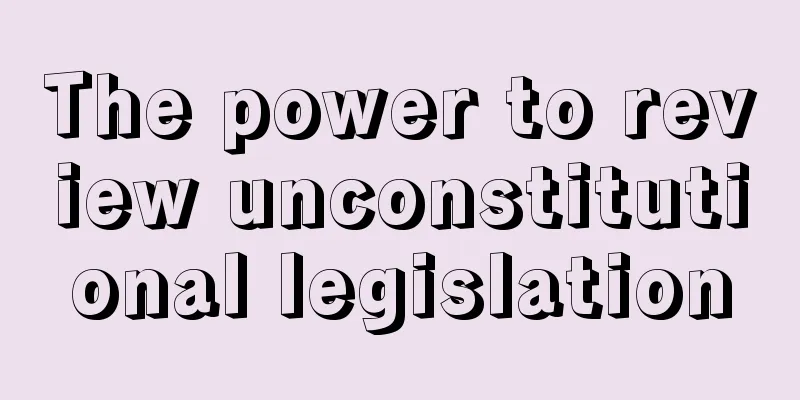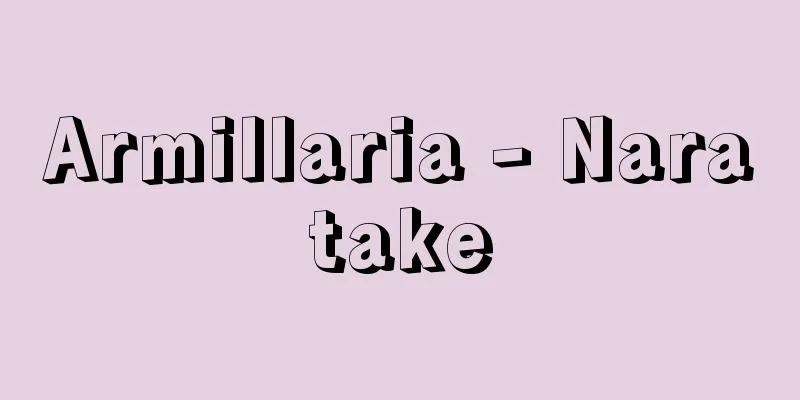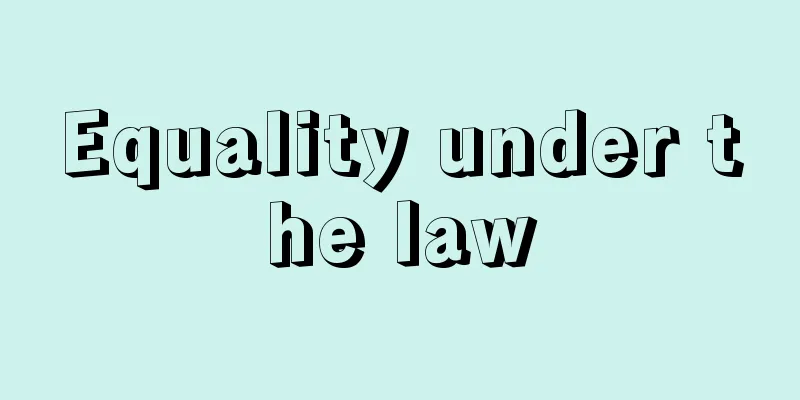The power to review unconstitutional legislation

|
This refers to the power of the court to examine whether the laws that apply to a case are in accordance with the Constitution and to determine whether they are valid or invalid. It is also called the power of statutory review. When this power is adopted as a system, it is often called the system of constitutional review. There are two types of power of statutory review: the formal power of review to examine whether a law was enacted lawfully, and the substantive power of review to examine whether the content of a law violates the Constitution, but the latter is usually referred to. [Masaaki Ikeda] historyIn the 19th century, in European countries such as Germany and France, the decision as to whether a law was in accordance with the constitution was left solely to the parliament or the king. This was because it was thought that when a law was enacted, the parliament or the king would have already judged whether it violated the constitution during the enactment process, and therefore there was no need for other national institutions to judge the constitutionality of the law. Based on this thinking, the Meiji Constitution also did not provide for the power to review unconstitutional legislation. On the other hand, in the United States, although there was no provision for it in the federal Constitution, in the case of Marbury v. Madison (1803), Marshall, the fourth Chief Justice of the United States Supreme Court, ruled that the federal Constitution was the supreme law and that any federal law that contradicted it was invalid, thus establishing the power of judicial review of unconstitutional legislation. In the 20th century, after World War I, the political and social situations of countries around the world were in great turmoil, which triggered the rise of totalitarianism and put the constitution at risk. Learning from this, after World War II, countries began to take an interest in systems to prevent violations and infringements of the constitution, and countries competed to adopt systems of constitutional review. Japan also followed this trend, stipulating in the Constitution of Japan that "The Supreme Court is the court of final appeal with power to determine the constitutionality of any law, order, regulation or official act" (Article 81). [Masaaki Ikeda] TypeEach country's system of constitutional review is divided into court-type and non-court-type, depending on the national institution that carries it out. An example of the latter is the French Constitutional Council, which differs from the former in that it reviews the constitutionality of laws enacted by parliament before they come into effect. The former court-based system of constitutional review is further divided into ordinary courts and special courts. The United States is a representative example of an ordinary court system, while Germany is a representative example of a special court system. The American system of judicial review is called judicial review, and it is when a dispute arises in a civil or criminal case as to whether the application of a law is in accordance with the Constitution, and the ordinary court reviews the constitutional issue. Therefore, the judgment of constitutionality is made as a prerequisite for resolving the civil or criminal case. In contrast, the German system of judicial review is called constitutional trial, and it is characterized by the fact that the constitutionality of laws is reviewed in an abstract manner, even if there is no specific case, and a special constitutional court has been established for this purpose. The world's systems of judicial review are roughly divided into these two types, and the American type is found in Latin American countries and Commonwealth countries such as Canada and Australia, while the German type is found in Western European countries such as Austria and Italy. In the case of the Japanese Constitution, there was a theoretical dispute as to which type it belonged to when the Constitution was first enacted, but the Supreme Court, in the so-called National Police Reserve Force Constitutional Lawsuit (October 8, 1952), interpreted it as adopting the American model, and has been operating based on this idea ever since. In other words, the constitutionality of applicable laws and measures is judged as a prerequisite for resolving civil, criminal, and administrative cases. Therefore, the court that reviews them is not limited to the Supreme Court, and all courts are considered to have the power to review unconstitutional legislation. Since the Supreme Court is the court of last resort in these cases, the concrete meaning of the Constitution is finally determined by the Supreme Court, and at the same time, this system means that the Constitution is guaranteed by the judicial procedure, which is why it is commonly said that "the Supreme Court is the guardian of the Constitution." This is an important authority given to the court by the Japanese Constitution. [Masaaki Ikeda] Exercise of review powerCourts exercise their power to review unconstitutional legislation in specific litigation cases. In other words, this power is exercised only when a person who has a legal interest in the litigation (called a party with standing) files a lawsuit requesting the resolution of a legal issue. This is called the existence of a case, and it is said that there is or is not a case. This corresponds to a "legal dispute" as stipulated in Article 3 of the Court Act. By the way, when the parties in a lawsuit claim that the law applied in the case is unconstitutional, does the court necessarily have to make a constitutional judgment? There are both positive and negative views on this issue. Japanese courts believe that it is preferable not to make a constitutional judgment if it is thought that the case can be resolved without making a constitutional judgment. This is because the court's job is to resolve the case, so there is no need to go into constitutional judgments. This view is called the "principle of avoiding constitutional judgments." Based on this principle, when the constitutionality of a certain law is disputed, if there is a suspicion that the law is unconstitutional if interpreted literally, the law is interpreted in a limited way (called a constitutional limited interpretation) and the law's effectiveness is maintained. Also, sometimes the law itself, the application of which is at issue in the case, is not deemed unconstitutional (called unconstitutional law), but rather the way in which the law is applied or applied is unconstitutional (called unconstitutional application or unconstitutional application). This way of exercising the power of review is called judicial passivism, and it is opposed to judicial activism, which holds that constitutional judgments should be made actively in order to protect the Constitution or human rights. However, it is said that the reason why the courts refrain from exercising the power of review is because they believe that (1) they should respect to the utmost the will of the Diet, which is the representative body of the people, and (2) that an active judgment of unconstitutionality is likely to disrupt legal stability and invite political confusion. Even if a law is found to be unconstitutional or invalid and the ruling is final, the law simply does not apply to the case in question, and the law itself does not immediately lose its effect (this is called individual effect). Furthermore, laws that are found to be unconstitutional or invalid can be repealed or corrected by the Cabinet or the Diet, to which the official text of the court decision is sent, so it is thought that no inconvenience will occur. [Masaaki Ikeda] "Ashibe Nobuyoshi (ed.), Lecture Series on Constitutional Litigation, 3 volumes (1987, Yuhikaku)" ▽ "Special Feature: The Current State of the Constitutional Review System" (Jurist, No. 1037, 1994, Yuhikaku) [References] | |Source: Shogakukan Encyclopedia Nipponica About Encyclopedia Nipponica Information | Legend |
|
裁判所が、事件に適用する法令について、それが憲法に適合するかしないかを審査し、その有効・無効を判断する権限をいう。法令審査権ともいう。また、これを制度として採用している場合には違憲審査制(度)とよばれることが多い。法令審査権には、法令が適法に成立したかどうかを審査する形式的審査権と、法令の内容が憲法に違反していないかどうかを審査する実質的審査権とがあるが、普通は後者をさす。 [池田政章] 歴史19世紀のドイツ、フランスなどヨーロッパ諸国では、法律が憲法に適合するかどうかの判断は、もっぱら議会や国王に任せられていた。それは、ある法律を制定する場合に、議会や国王がその制定過程のなかで憲法に反するかどうかの判断をしているはずであるから、あらためて他の国家機関がその法律の憲法適合性を判断する必要はないと考えられたからである。明治憲法においても、このような考え方に基づいて、違憲立法審査権について規定しなかった。 他方、アメリカ合衆国においては、連邦憲法に規定はなかったが、マーベリー対マディソン事件(1803)において、第4代合衆国最高裁判所長官マーシャルが、連邦憲法は最高法規であり、これに反する連邦法は無効であると判決し、ここに違憲立法審査権が確立した。 20世紀に入ると、第一次世界大戦後に世界各国の政治的・社会的状況が大きく動揺し、それを契機に全体主義が台頭して憲法は危機にさらされた。それを教訓として第二次世界大戦後は、憲法の違反や侵害を防ぐ制度に各国の関心が集まり、各国は競って違憲審査制(度)を採用した。日本もこの潮流にのって、日本国憲法に「最高裁判所は、一切の法律、命令、規則又は処分が憲法に適合するかしないかを決定する権限を有する終審裁判所である」(81条)と規定した。 [池田政章] 類型各国の違憲審査制(度)は、それを行う国家機関によって、裁判所型とそれ以外のものに分かれる。後者の例はフランスの憲法院であり、議会で制定された法律が施行される前に、合憲性の審査をするということで、前者の違憲審査とは異なる。前者の裁判所による場合は、さらに普通裁判所によるものと特別裁判所によるものとに分かれる。普通裁判所によるものの代表例はアメリカで、特別裁判所によるものの代表例はドイツである。 アメリカの違憲審査制は司法審査といわれるが、それは、通常の民事事件あるいは刑事事件において、その適用が問題になっている法規が憲法に適合するかどうかが争われている場合に、普通裁判所がその憲法問題を審査する。したがって、違憲か合憲かの判断は、その民事事件や刑事事件を解決するための前提問題としてなされるわけである。これに対して、ドイツの違憲審査制は憲法裁判といわれるが、それは、具体的な事件がなくとも、抽象的に法規の合憲性審査がなされるという点に特色があり、そのために特別の憲法裁判所が設けられている。世界の違憲審査制は大まかにこの二つの種類に区別され、アメリカ型をとる国は、ラテンアメリカの国々や、カナダ、オーストラリアなどイギリス連邦の国々であり、ドイツ型をとる国は、オーストリア、イタリアなど西ヨーロッパの国に多い。 日本国憲法の場合、どちらのタイプに属するかについては、憲法制定当初において学説上の争いがあったが、最高裁判所は、いわゆる警察予備隊違憲訴訟(1952年10月8日)において、アメリカ型を採用したものと解釈し、以来、この考え方に基づいて運用されている。つまり、民事事件、刑事事件、行政事件を解決するための前提問題として、適用する法令や処分の合憲性を判断する。したがって、それを審理する裁判所は最高裁判所に限定されず、すべての裁判所が違憲立法審査権をもつとされる。最高裁判所はこれらの裁判の終審裁判所であるから、憲法の具体的な意味は、最高裁判所によって終局的に確定され、同時にこの制度は憲法を裁判手続によって保障することを意味し、そこから「最高裁判所は憲法の番人である」などと通俗的にいわれる。日本国憲法が裁判所に与えている重要な権限である。 [池田政章] 審査権の行使裁判所が違憲立法審査権を行使するのは、具体的な訴訟事件においてである。つまり、訴訟について法的利益を有する者(これを当事者適格という)が、法律問題の解決を請求して提訴した場合にのみ、この権限が行使される仕組みである。このことを事件性といい、事件性がある、ないといわれる。裁判所法第3条に規定する「法律上の争訟」がこれにあたる。 ところで、裁判の当事者が当該事件で適用される法律の違憲性を主張していたら、裁判所はかならず憲法判断をしなければならないのかという問題に関しては、考え方に肯定説、否定説の双方がある。日本の裁判所は、憲法判断をしなくとも当該事件を解決しうると考えられる場合には、憲法判断をしないのが望ましいとの考え方にたっている。それは、裁判所の職務は当該事件の解決にあるから、あえて憲法判断に立ち入る必要はないという理由からであり、このような考え方は「憲法判断回避の原則」といわれる。この原則に基づいて、ある法律の憲法適合性が争われている場合に、その法律を字義どおり解釈すると違憲の疑いがあるというときは、その法律の意味を限定して解釈して(合憲限定解釈という)、その法律の効力を維持するということが行われる。また、当該事件において適用が問題となっている法令そのものが違憲(法令違憲という)だと判断せずに、法令の適用あるいは運用の仕方が違憲(適用違憲または運用違憲という)だということもある。このような審査権行使の仕方を司法消極主義といい、憲法あるいは人権擁護のために積極的に憲法判断をすべきであるという司法積極主義と対立する。しかし、裁判所が違憲審査権の発動を自制するのは、(1)国民代表機関たる国会の意思を最大限尊重すべきである、(2)積極的な違憲判断は法的安定を乱し政治的混乱を招きやすい、と考えているからであるといわれている。 ある法令が違憲・無効とされ、その判決が確定しても、その法令は当該事件には適用しないというだけで、その法令自体の効力が判決によってただちになくなるわけではない(個別的効力という)。そして、違憲無効と判定された法令は、その裁判書の正文を送付された内閣なり国会によって廃止もしくは是正の措置がとられるので、不都合はおこらないと考えられている。 [池田政章] 『芦部信喜編『講座憲法訴訟』全3巻(1987・有斐閣)』▽『「特集 違憲審査制の現在」(『ジュリスト』1037号・1994・有斐閣)』 [参照項目] | |出典 小学館 日本大百科全書(ニッポニカ)日本大百科全書(ニッポニカ)について 情報 | 凡例 |
>>: Residence inspection - Ikenchi
Recommend
Yamashina family
The Northern Fujiwara clan, Shijo line. The clan ...
Malunion - Henkeiichiyu (English spelling)
This refers to a condition in which a fracture hea...
Sea strawberry (Umiichigo) - Bellonella rubra
A coelenterate (cnidaria) of the family Alcyonidae...
Raphael von Koeber
German philosopher. Born in Nizhniy Novgorod (now...
anthropoid
...A general term for mammals belonging to the Po...
Shishiran - Shishiran
An evergreen fern of the family Lamiumaceae. Also...
Alcohol - arukoru (English spelling)
In the narrow sense, it refers to ethanol (ethyl ...
Old age pension - roureinenkin
A pension paid to elderly people over a certain a...
Ise Daikagura
…(4) In Shishi Kagura, the lion's head is wor...
Jun yao (English spelling)
One of the labor systems in the Ming Dynasty in Ch...
Fractography
This is translated as fracture surface analysis. I...
Japan-US Security Treaty
Officially, it is the "Treaty of Mutual Coop...
Lithopone - Lithopone (English spelling)
A white pigment made from a mixture of zinc sulfi...
Manettia inflata (English spelling)
…[Kazuo Furusato]. … *Some of the terminology exp...
atresia hymenalis
…A condition in which part of the genital lumen i...









